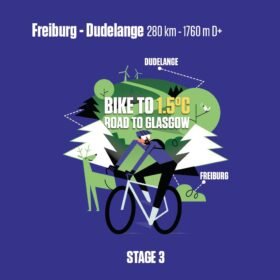TOWARDS GLASGOW, OCTOBER 25 – On the two wheels of a Wilier Triestina Rave SLR, Omar Di Felice is currently traveling to Glasgow: a long crossing with strong symbolic as well as sporty value, 2000 km and 8 days of pedaling to reach the Scottish city where on November 1st the climate conference COP26 will begin, marking perhaps the last chance in world history to reverse global warming.

Today’s ride is Canterbury to Leicester, 265 miles in total, with a stopover in London to talk with a special guest. The “ultracyclist of the cold” left Milan on October 23rd: his solo race through Switzerland, Germany, Luxembourg, Belgium, France and the United Kingdom touches some symbolic places for the climate crisis, such as the receding glaciers of Ticino or Freiburg: “An exemplary city for management and energy efficiency, with specific no-vehicle areas and an urban environment that seems to be the extension of the natural context in which it stands, the Black Forest”, he explains. Crossing the French border, other significant sightings include nuclear power plants and the European Parliament: “A month ago the European Commission published a document on energy efficiency in which the bicycle was included as an effective tool to reduce energy consumption across the Union”.
Supporting Omar’s on his social media profiles are scientists, technicians and climatologists – among them Elisa Palazzi, Climate Physics and associate professor at the University of Turin, Potito Ruggiero, environmental activist and co-author of the book “We keep an eye on you. The sustainable future explained well”, and Matteo Dondè, an urban architect who for 20 years has been involved in cycling – that every day during the travel week are connecting live to address the central issues of what will be in Glasgow. Di Felice’s message is always the same: “With a bike you can go anywhere”, writes the cyclist on his Facebook page: “Because the bicycle is the most sustainable mean to move and, consequently, to buy more liveable urban space again, without vehicular traffic, and to reduce emissions from car fuels”.

The name chosen for the project is “Bike to 1.5 C”, the average rising threshold of the earth’s temperature that scientists deem the minimum necessary to reverse the course of climate change. The first stage, Altdorf, was reached through the Gotthard Pass: a 220 km and 3200 meters of altitude difference. “Did you know that global warming affects mountains more, where it proceeds at twice the global average rate? And that not only glaciers melt, but also snow decreases with many consequences even for those who live in the plains? Over the last decade, the retreat of glaciers around the world, from alpine areas to Antarctica, is often cited as a clear and unequivocal sign of the rise in temperatures, caused by human activities. In the Alps it is particularly serious and some glaciers could disappear in the coming decades” warns Omar on Facebook.

Omar Di Felice was borne in Rome 40 years ago. Impressed by Marco Pantani exploits in 1994, he started his bycicle carreer. After having raced among the competitive categories of traditional cycling, crowning his career with a year in the ranks of professionals, in 2012 he decided to move to ultracycling, excelling in several Italian and international competitions. In 2018, he crossed the Arctic Canada, pedaling for about 1300 km on the Arctic Highway after reaching North Cape and crossing Iceland duringWinter.
One of his latest feats, in February, was mountain biking on the Himalayan trails to reach the Everest base camp: 1300 km and 4 thousand metres of altitude difference with temperatures of -30 degrees. Omar also crossed the Gobi desert in Mongolia (he was later blocked in Ulan Baatar because of Covid), and arrived third at the Trans America Bike Race across the United States. He loves harsh temperatures and extreme conditions, which he likes to call the “Omar Zone” (which is also the title of his last book published by La Nave di Teseo). (@giorgiodelgallo)

